Ecbatana - Death of Darius (330)
Another time, one of the common soldiers was driving a mule that carried some of Alexander's
treasure. The mule was too exhausted to go on, so the soldier put the load on his own shoulders. Alexander saw the man
and he asked what was the matter. The soldier told him that the mule was too tired to carry the load, and that he was about
at the end of his endurance too. "Don't give up now," said Alexander, "but carry what you
have there to the end of the journey, then take it to your own tent, to keep for yourself."
Later in spring 330 Alexander marched north, passed Pasargadae and in the country of Medians, in July 330, he occupied the capital Ecbatana. All Greeks, except Macedonians were free to return to their cities. Alexandros wanted his soldiers to spread the triumph of his victories and successes to all over Hellas. But most of the soldiers chose to stay and followed their valiant leader. The Macedonian king continued the pursuit of the Persian emperor. Harpalus and Parmenio were left behind to support the communications of the army and keep all the persian treasure. The Greeks passed the Caspiae Pylae (Caspian Gates) south of Caspian or Yrcanian Sea. There Alexander was informed that Darius was arrested by the satrap of Bactria, Bessus. He jumped on Voucephalas and followed by his cavalry chased the usurper of the throne. The Thracian scouts found Darius stabbed in his coach and Bessus proclaimed himself "King of the Kings". This was the end of the Great king. Alexander sent his body to Darius' mother who organized an imperial funeral for the last Persian emperor.
At Zadracarta in Hyrcania, Alexander rested his army. It was there that he first put on barbarian clothes and this caused to
his friends and his soldiers unease. There they felt offended and disappointed, because Alexandros was not any
more their leader especially when he appointed Persians as governors (like Artabazus, Varsines' father),
and enlisted thousands of Persians in the army.
Later he moved eastward and in Aria he met serious resistance from the satrap Satibarzanes. He conquered the city
Artacoana, and founded a new one with name Alexandria of the Aryans (modern Herat).
But officers and soldiers wanted to return home, tired of their long campaign, tired of
long marches (they had covered more than 10000 kilometers).
After the conquest of the persian empire their mission was over. Why should they go on and conquer unknown and hostile lands?
It was Cevalinos, a young soldier that heard some officers talk about the murder of the king. He reported to
the commander of the Companion Cavalry, Philotas. Philotas, son of Parmenion didn't mention anything
to his king and when the
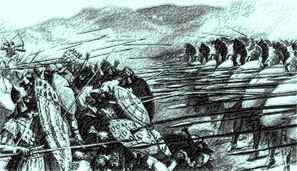 conspiracy was weaved, Alexander ordered the torture and execution of all the conspirators including Philotas. He also sent
message to
his generals to Ecbatana to murder Parmenio. So the old general of Phillipus who had lost
three sons and had served
faithfully Alexander and Philipus, was murdered, without evidence for his guiltiness. Alexandros had become cruel and
demoralized or he used any method in order to protect his new empire?
conspiracy was weaved, Alexander ordered the torture and execution of all the conspirators including Philotas. He also sent
message to
his generals to Ecbatana to murder Parmenio. So the old general of Phillipus who had lost
three sons and had served
faithfully Alexander and Philipus, was murdered, without evidence for his guiltiness. Alexandros had become cruel and
demoralized or he used any method in order to protect his new empire?
Bactria - Sogdia
The Greek king of Asia with his friends Hepheastion, Perdiccas, Ptolemeos, Selephcos, Leonnatos, Lusimachos, Crateros and Clitus started again the pursuit of Bessus who had found selter to the high mountains of Bactria, at the extreme limits of the Persian Empire (modern Afghanistan). Alexandros founded Alexandria in Arachosia (modern Kandahar) and Alexandria by the Caucasus and settled Greek soldiers with their familes, soldiers who didn't wish to pass through those huge and very cold mountains. (Even today there is the tribe of Callas in Afghanistan, who claim that they are descendants of Alexander, and their gods are Alexandros and Zeus). After the heat of the desert, Alexander's army had to face the snow of the mountains. Many of his soldiers were blinded by sun's reflection to the snow. After weeks of march the Greeks reached the capital Bactra where they rested for a while. They continued north, crossed with difficulty Oxos River (they made rafts from animal skins and tents which were stuffed with hay) and Ptolemeos as commander of the vanguard, arrested Bessus, whose soldiers had abandoned alone. He was tortured, mutilated after the Persian manner, and after some days he was sent to Ecbatana where he was publicly executed.
Next to the river Oxos, in 329, the city Alexandria of Oxos was founded
and more Greek veterans decided to stay there with their wives and start a new life. They wouldn't see again the land where
they had been born. The indefatigable king continued north, fighting against sauvage tribes and reached Maracanda,
(modern Samarkand),
capital of Sogdiane. From there Alexander conquered Cyropolis and vanquished the Scythian nomads, by the use of catapults.
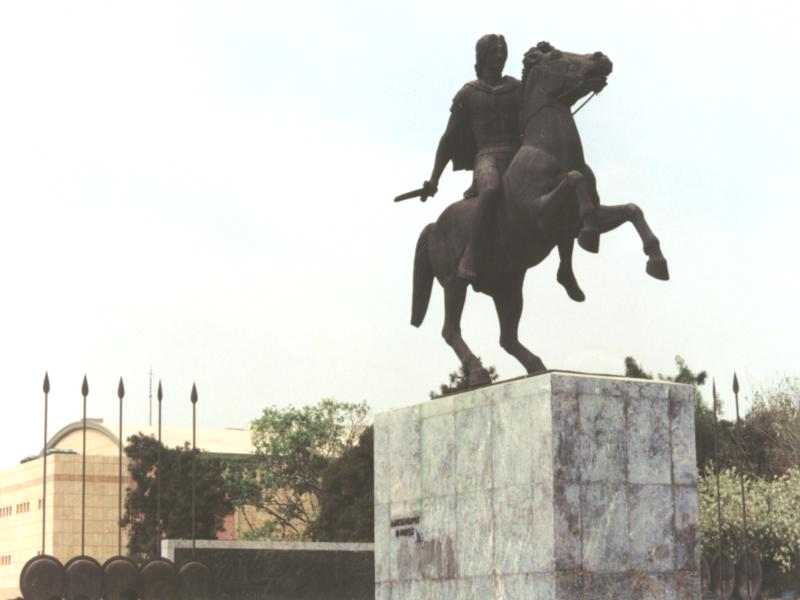 In 328, near to Iaxartes River, he founded another city, Alexandria Eschate
(greek word, meaning ultimate). Hundreds of Greek soldiers decided to stay and start a new life.
Meanwhile, Spitamenes had raised revolt, with the Massagetai, a warlike tribe, and massacred the Macedonian garrison of
Maracanda.
Craterus and Coenus were sent to crush the rebellion which they did succesfully. Spitamenes was killed by his own men
and his head was sent to Craterus as a sign of the submission of Sogdia to the Hellenes.
In the spring of 327 he reached the Sogdiane Petra (Sogdian Rock). It was a fortress located on a high and very
precipitous rock. The satrap Oxyartes told Alexander that only if his soldiers had wings, they could take his fortress.
Alexander asked for volunteers and promised 12 talents to the first, 11 to the second, 10 to the third etc, who would climb
the rock. During the night, 300 Thracians and Macedonians tried to climb the rock using ropes and poles. Thirty of them were
killed, but the rest made it and raised their flag, the star of Argeads
to show to the enemy that they were above him.
Oxyartes surrendered and he became friend with the invincible Macedonian. Alexander married Roxanne, the excuisite daughter
of the Sogdian leader.
In 328, near to Iaxartes River, he founded another city, Alexandria Eschate
(greek word, meaning ultimate). Hundreds of Greek soldiers decided to stay and start a new life.
Meanwhile, Spitamenes had raised revolt, with the Massagetai, a warlike tribe, and massacred the Macedonian garrison of
Maracanda.
Craterus and Coenus were sent to crush the rebellion which they did succesfully. Spitamenes was killed by his own men
and his head was sent to Craterus as a sign of the submission of Sogdia to the Hellenes.
In the spring of 327 he reached the Sogdiane Petra (Sogdian Rock). It was a fortress located on a high and very
precipitous rock. The satrap Oxyartes told Alexander that only if his soldiers had wings, they could take his fortress.
Alexander asked for volunteers and promised 12 talents to the first, 11 to the second, 10 to the third etc, who would climb
the rock. During the night, 300 Thracians and Macedonians tried to climb the rock using ropes and poles. Thirty of them were
killed, but the rest made it and raised their flag, the star of Argeads
to show to the enemy that they were above him.
Oxyartes surrendered and he became friend with the invincible Macedonian. Alexander married Roxanne, the excuisite daughter
of the Sogdian leader.
The murder of Clitus and Callisthenes
A terrible incident happened at Maracanda during a symposium. Alexander had a quarrel with Clitus Melanas (Melanas means black in greek). Both were heavily drunk, and Melanas accused his king for the barbarian clothes and customs that he wanted to impose to his men. "You are going to be punished for those words", said Alexandros. "You are nothing. We the soldiers have done all the fighting. This hand saved the life of the Son of God at the battle of Granicus", was Melanas' answer. The emperor became mad, grabbed a spear from an aid-de-camp and threw it to his soldier and friend. Clitus was killed and when Alexander realized what he had done, he nearly commited suicide, but was saved by his friends. He mourned for three days without eating or drinking anything.
Shortly afterward, at Bactra, he attempted to impose to everyone the proskynesis, (greek word, meaning prostration). The Greeks and especially the historian Callisthenis of Olynthos couldn't accept this custom which was not used in their liberal and proud society. Callisthenes, who was not a flatterer, spoke audaciously and insulted Alexander. When later another conspiracy was revealed, the name Callisthenes was mentioned and the nephew of Aristotle with all conspirators were executed.
India - 327
It was spring of 327, when Alexander started his campaign to India. The Greeks knew India from the Histories by Herodotus of
Halicarnassus and from the History of India by Ctesias of Cnidus.
The Greek army according to Plutarch's writings had 120000 men,
including 15000 cavalry and passed through the Parapamisos mountains, where many soldiers died because of the
heavy snow and the cold. Later Alexander divided his forces, half the army with the baggage, under
Hephaestion and Perdiccas,
was sent to the east, while he himself with the rest, moved to the north to occupy the cities
Massaga, Vazira and Ora.
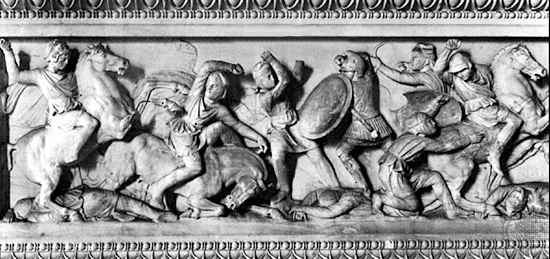 A few miles west of the Indus was a high mountain fortress called Aornus (modern Pir Sar). According to the legend, not
even Alexander's ancestor Heracles had been able to take the rock. However, Ptolemeos managed to occupy a nearby mountain and
from there Alexandros stormed and conquered the city. 250000 oxes were found in Aornus and were sent to Macedonia to
be used for the ploughing of the fields.
A few miles west of the Indus was a high mountain fortress called Aornus (modern Pir Sar). According to the legend, not
even Alexander's ancestor Heracles had been able to take the rock. However, Ptolemeos managed to occupy a nearby mountain and
from there Alexandros stormed and conquered the city. 250000 oxes were found in Aornus and were sent to Macedonia to
be used for the ploughing of the fields.
Meantime Perdiccas and Hephaestion had built a bridge over the Indus and when the two armies were joined, in spring 326, they reached Taxila. The king Taxiles welcomed the Yiounan, as the Greeks were called by the Indians, and offered to their king elephants and troops. There Alexandros met the Brahman philosophers who had no property no clothes and could stay motionless for days. One of them, Calanos, joined the army and became Alexander's adviser.
In June 326, Alexander reached the Hydaspes river just as the rains broke, when it was already swollen.
On the other bank of the Hydaspes Porus (Paurara rajah), one of the most powerful Indian kings,
had camped. Porus was a huge man
and had among his brave and tall soldiers also 200 elephants and military chariots. During the night Alexander crossed
the river and in a first skirmish with the enemy he killed Porus' son. The indian ruler attacked immediately but his chariots
were unable to move through the mud. The Indians although they fought bravely were defeated.
Porus wounded was captured by the Greeks.
"How would you like to be treated?" asked him the Macedonian king.
"Like a king" was the answer of the Indian.
So Porus was allowed to continue to reign his country. Alexandros founded two cities: Alexandria Nicaea
(Nicaea means victory in greek)
and Bucephalia (named after his horse Bucephalas, who was wounded and died.
The horse was 17 years old and Alexander grieved like he would, if he had lost a good friend).
The Hellene emperor reached the Hyphasis river, near the Imalaia mountain range, after having marched 30000 kilometers, since
he had left Pella of Macedonia, 8 years ago. Alexander was anxious to cross Ganges and move farther to see the Great Ocean.
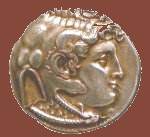 But the tropical rain kept falling in the jungle and the men had reached their limits. They refused to proceed and
Coenus, a brave Macedonian general acted as their spokesman. Alexandros became angry and stayed 3 days and nights in his
tent. When he came out he had taken his decision to return home. He announced his decision to his army and on the Hyphasis
river he erected 12 huge altars to the 12 Olympian gods. Athletic games and theatricals were organized and also
a copper plate saying: "Alexandros entautha esti" (Alexander came here)
was erected.
Not too long afterwards Coenus died and the army buried him with the highest honors.
But the tropical rain kept falling in the jungle and the men had reached their limits. They refused to proceed and
Coenus, a brave Macedonian general acted as their spokesman. Alexandros became angry and stayed 3 days and nights in his
tent. When he came out he had taken his decision to return home. He announced his decision to his army and on the Hyphasis
river he erected 12 huge altars to the 12 Olympian gods. Athletic games and theatricals were organized and also
a copper plate saying: "Alexandros entautha esti" (Alexander came here)
was erected.
Not too long afterwards Coenus died and the army buried him with the highest honors.

 ||1.|-|2.|-|3.|-|
4.|-|5.|-|6.|-|
7.||
||1.|-|2.|-|3.|-|
4.|-|5.|-|6.|-|
7.||
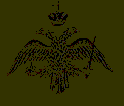 _____
_____




